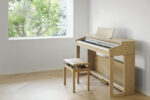We’ve all been there before– Playing the piano for your friends or family, and suddenly, your hands are shaking. So, why does this happen? And how can you stop this from happening? There are many reasons why your hands may shake while playing the piano, including nerves, insecurity, mental stress, physical disability, etc. So, why do your hands shake while playing piano? In this article, we’ll show you how to conquer shaky hands while playing piano:
Get Comfortable Being Nervous
Our first tip is for those struggling with nerves/ insecurity while playing the piano. Get comfortable being nervous. We know you don’t hear this every day, right? You may be the best piano player in the world, but that doesn’t mean you won’t get nervous. It IS possible to “feel” shaky but have hands that do what you need anyway.
Imagine someone who intimidates or inspires you is standing close by while you play the piano. Your hands will start to feel shaky, and hopefully, you’ll make some mistakes while stumbling along. As you proceed, mentally note the breakdowns, and then go back and fix each separately. (Most mistakes start one or two bars earlier due to a lack of attention to the connection with the breakdown place.) Repeat the whole process as many times as necessary.
Know What You’re Playing
This tip may be more obvious, but know what you’re playing. Especially if you’re performing, not knowing what you’re doing will most likely have your nerves take over your hands. Again, it is possible to feel nervous while not letting the nerves take over your body.
A great way to “know” your stuff is by practicing your piece/ performance enough that it almost becomes muscle memory. Know each finger placement, memorize the song’s dynamics, and practice your body language and what the song requires from you. If you do this, you’ll quash shaky hands easily.
What To Avoid Before Playing
You may have heard that singers must take care of their vocals before performing. But does the same apply to musicians? Short answer, sometimes! You may think coffee doesn’t “affect” you, but you may be surprised to find out how much caffeine affects your body. Avoiding coffee or energy drinks before a performance will help tremendously if you’re a caffeine lover. Other foods that may cause nervous feelings include:
- Alcohol
- Sugary Drinks and Foods
- Processed Foods (chips, cookies, frozen foods, etc.)
- Foods high in trans fats (fried foods, red meat, full-fat dairy, butter, etc.)
Build Your Finger Strength
You may hear this tip often because it’s very important: build up your finger strength. You may have difficulty controlling your fingers/ hands while playing piano simply because your fingers need “strength training.” Our fingers have muscles and joints that require constant stretching and correct form while playing the piano. Watch this video on finger exercises to build strength:
Finally, if your finger trembling frequently occurs while you play or practice and is NOT a result of performance anxiety, you may have neurological conditions unrelated to nerves. Visit a doctor.
Conclusion
So, are you ready to conquer shaky hands while playing piano? We hope this article was helpful to you. We believe that you can do this! If you have any more questions about piano playing and pianos, we can help you!
Check out our new and used pianos to purchase your dream piano, and contact us! For any questions, chat with us, fill out a form, or call us at 615-771-0020! Our hours are Monday-Saturday from 10 am to 6 pm. We are here for you.









